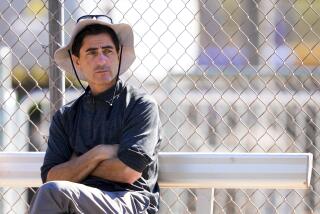Padres, Royster Agree on Two-Year Contract
- Share via
SAN DIEGO — Although the Padres were unable to sign Rick Sutcliffe or Fred Lynn, at least they didn’t get shut out completely in the free agent market this off-season.
Utilityman Jerry Royster, one of six free agents drafted by the Padres in November, was signed Thursday to a two-year contract with an option for a third year.
Manager Dick Williams plans to use Royster much the same as he did Luis Salazar last season. Salazar was traded to the Chicago White Sox last month. Williams said Royster will spell Graig Nettles at third base against tough left-handers, plus be used as a backup at other positions.
“When Salazar went to the White Sox, we had to get another infielder or utilityman,” Williams said. “Jerry can play second base, shortstop, third base, outfield or catch if he had to. I told him to bring all of his gloves with him.”
Royster, 32, played 29 games at second base, 17 at third base, 16 at shortstop and 11 in the outfield for Atlanta in 1984. He batted .207 in 227 at-bats with 1 home run, 21 RBIs and 6 stolen bases.
“We expect Jerry to give us depth and flexibility because of his ability to play several positions well,” General Manager Jack McKeon said. “He has good speed and is a proven performer. Plus, he gives us the right chemistry and blends in well with our ballclub.”
Royster originally was signed by the Dodgers in 1970 and played his first professional season in 1971. He played part-time in the majors from 1973 to 1975 before being traded to Atlanta with Jimmy Wynn, Lee Lacy and Tom Paciorek for Dusty Baker and Ed Goodson.
When Atlanta won the National League West in 1982, Royster had his best season ever, batting .295 in 108 games. He hit .334 over the final two months of the season while playing regularly in left field.
Royster often spelled Bob Horner when the Braves’ regular third baseman was injured. But Atlanta traded for Ken Oberkfell after Horner was injured in 1984, greatly diminishing Royster’s role.
By the end of the season, Royster let it be known he was unhappy with his status.
“When he first went there, he wanted to play each day,” Williams said. “They signed him to a five-year contract (in 1980), then they put him in the background. I can’t blame him for wanting to play each day. He’ll be a backup player with us, but he’ll see more action than the normal backup player.”
More to Read
Go beyond the scoreboard
Get the latest on L.A.'s teams in the daily Sports Report newsletter.
You may occasionally receive promotional content from the Los Angeles Times.










